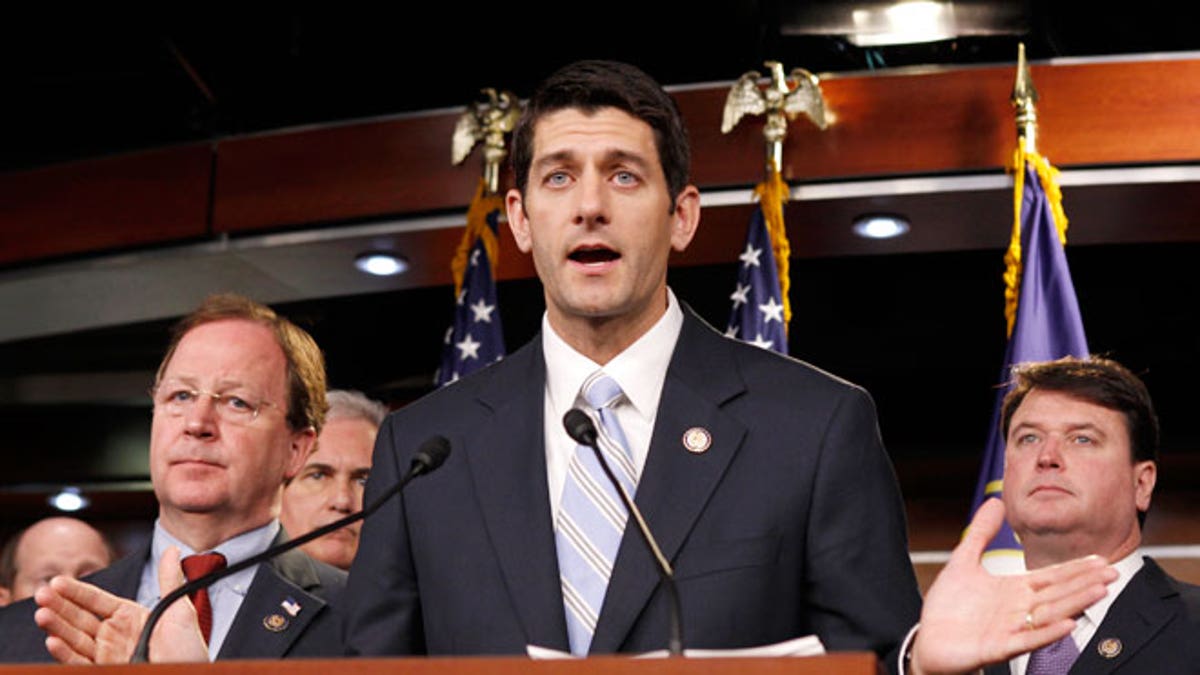
(Reuters)
Mitt Romney is schmoozing with as many conservatives as possible, trying to convince them that he is the “conservative alternative” to ... Mitt Romney. Rush Limbaugh has said as much, pretty much stamping the “conservative” seal of approval on Mitt.
But to appeal to the libertarians and free marketers who are worried about Romney’s recent endorsement of the TARP bailouts, Mitt’s got to do more than schmooze. He’s got to actually endorse a specific growth plan to heal the deep wounds inflicted on this economy by massive government intervention over the past four years.
Fortunately, such a plan is already on paper. Budget Committee Chairman Paul Ryan just published it. And now Romney should unabashedly endorse it.
There should be no shame for a candidate endorsing a plan worked out by someone else. Ronald Reagan borrowed from Jack Kemp, The Wall Street Journal’s editorial board and the Heritage Foundation for the specifics of what came to be called “Reaganomics.” Christie Todd Whitman used a group of economists including Steve Forbes to develop a tax-reduction plan that made her Governor of New Jersey.
Romney would be in good and successful company if he bought into what Ryan has created.
If Romney did nothing more than accept just the tax part of the Ryan plan, he would do much to quell the qualms of those conservatives who don’t trust his instincts. Ryan’s tax plan is simple and powerful. Two individual rates -- 15% and 25% -- would enormously simplify what has become a monstrous and costly burden of compliance for individuals and companies.
The Ryan plan’s end of double taxation for companies that do business overseas would assure not only a free expansion of business opportunities, but also would bring trillions in cash back home to hire more, grow more and prosper more.
The plan itself is simple, straightforward and dynamic. And best of all, it gives businesses and individuals something they could plan around, instead of the haphazard mish mash of policies and tax credits that have been issued like imperial edicts over the past few years. It’s the lack of certainty as much as anything else that has limited growth in this country.
It would be great if Romney would also accept the Ryan plan’s budget cuts and reconfiguration of Medicare and Medicaid…but that’s probably too high a leap for the moderate Romney. However, adopting the tax plan alone would be a way to assure Americans that he has a very specific game plan to enact on day one of his presidency.
It would give the Romney campaign something more than a vague political promise to make things better. It would strengthen his mission and shore up confidence that real, strong growth would not become secondary to income redistribution or the elimination of carbon fuels.
It must be noted that there is a deeper problem that free marketers have with Romney that will not be silenced by his adoption of the Ryan tax plan. And that’s a fear that his faith in the free market is not firmly rooted enough to withstand another crisis without new government interventions. His recent endorsement of George W. Bush’s TARP bailouts gave those of us who were against the bailouts from the beginning considerable pause.
I had an interview with Bush in October 2007, just as the storm clouds of the financial crisis were forming. On Air Force One, I asked President Bush whether he would let the free market handle the mounting problems of mortgage giants Fannie Mae and Freddie Mac, which were eventually nationalized by Bush himself.
“I’m not an Ayn Rand free marketer,” Bush told me. “I just don’t believe that the free market can solve everything.”
One gets the sense that Romney feels exactly the same, and his endorsement of the TARP bailouts confirms the suspicion.
There’s no doubt that the next presidential term will deal with major financial crises, as interest rates rise along with payments due for the trillion-dollar deficits built up during the Obama/Pelosi years . We’re able to pay off the interest on these debts for now because of the cheap credit provided by an obliging Federal Reserve. But once interest rates rise, those payments will go way up, and it’ll be harder than ever to keep things afloat. In fact, we may be hit with a double whammy as inflation kicks in, as well.
It’s going to take a strong president to resist the calls for even more debt spending to bail out the institutions that will invariably be tested by these tough times. President Bush was true to the words he gave me in the fall of 2007 that he would not let the markets take their course. Would Romney be any more resistant to the strains of crony capitalism that largely drove the bailouts?
There are some cynical conservatives saying that it might be better to have a Democrat in office when the stuff hits the fan than another moderate Republican who will initiate a whole new round of trillion-dollar bailouts. I’m not as partisan as that. I’m an American who’s unwilling to see Americans suffer for the sake of a political party. I‘d rather have Romney adopt a good game plan than wish for his failure because he’s a moderate.
Mitt Romney is not the most free market oriented person to run for president, but he may be persuaded to adopt the right plan, even if just to solidify his base. Bill Clinton was not a true believer in the free market, either, but he agreed to lower the capital gains tax rate, helped reform welfare, and declared that “the era of big government is over.” (Of course, he was wrong on that last point, but the sentiment was right.) And he showed that the free market can be helped along in this country even by those who may not appear to be its friend.
Romney may not wholeheartedly believe in the Ryan tax plan. But if he adopts it -- even if just for political expediency of the kind we once saw from Bill Clinton -- it would be a great thing for his campaign and for the country.




